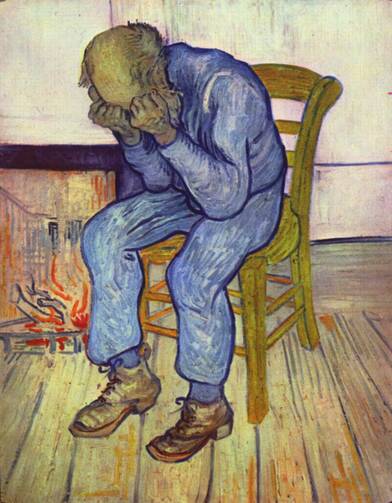One Saturday evening, shortly before Mass, a man called me to his side. I didn’t know him well, as I only came to the parish to provide weekend assistance. “I want you to have this,” he said, handing me an envelope with my name on it. “You can read it later.”
That night, I opened the envelope. Inside was a prayer the man had carefully composed:
It’s a haunting prayer. I’ve kept it because I want to pray for the man and because I am edified by his act of faith. Darkness will claim all of us, but most of us, mercifully, don’t know the details of our deaths. We certainly don’t foresee the dissolution of our minds.
To be human is to be an intellect immersed in its surrounding world, a mind that emerges from a body, a physical presence in the world. Everything we’ve come to know and to love, we gained by way of the world and those who people it. But we are fragile, fugitive intellects. As Michael Kinsley recently pointed out in a New Yorker article, Baby Boomers are the first generation to know that dementia is coming. We see it take our parents, who weren’t forewarned, but we know that we will live long enough to have survived the alternatives.
On the night before he died, the Lord Jesus instituted what we have come to call a sacrament. Indeed, it is the primordial sacrament, the one to which the others lead or from which they flow. Sacraments conjoin two very disparate realities: the spiritual and the physical. At least that’s what we like to think. The truth is that the human is always a commingling of the two. God and the angels are pure spirits. We aren’t. The only beauty we’ve seen comes to us by way of our eyes. Our truths are rooted in the earth. Even our minds emerge from the neurons of the brain. The specter of dementia reminds us who we are. Not pure spirits, but brutes who dream of beauty and grace, until matter pulls away from mind and we dissolve.
But we believe that the God beyond us—a pure spirit, an unsullied intelligence—chose to come among us, to become one of us. And he remains among us in mystery, in sacrament. Is it any wonder skeptics find this all too good to be true?
When Catholics speak of the real presence they profess their belief in the promise of God to remain among us in matter, in the material world. But this real presence of God is always a directed presence. God uses the matter of the sacrament in the same way we use our bodies, to communicate the spirit. If two spirits don’t come together in the sacrament, our own and God’s, there is no sacrament. An animal could consume the contents of a chalice or ciborium, but it would not receive, would not know, Holy Communion.
Does this not then raise an inevitable, unsettling question? What then of the soul whose mind is lost to the world? Can such a one receive a sacrament? Can he or she know Holy Communion? Yes, just as an infant whose mind has not yet fully emerged from matter can truly be baptized. Indeed, one could argue that the truth of all sacraments stands forth more firmly at such a time. We anoint and absolve the comatose; we baptize the infant; we share Eucharist with the demented, because to be a believer is insist that something spiritual, something beyond the material is pulling it—pulling us—towards itself.
Those who would turn evolution into a dogma would tell us that spirit stumbled out of matter one day. Of course the converse of that creed is that the mind can, and will, someday fall back into the material. But the human spirit rebels against such a fate.
Some would say the universe can’t possibly care, and they would be right. The material will never cry, indeed cannot cry, for the spiritual. But we cry, and our tears give such reasoning the lie, because tears, like sacraments, emerge from matter, but only at the command of spirit.
Deuteronomy 8: 2-3, 14B-16A 1 Corinthians 10: 16-17 John 6: 51-58








